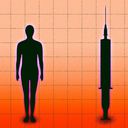How prior coronavirus infections factor into herd immunity

People who were previously infected with the coronavirus have some level of protection against reinfection, but that doesn't mean they shouldn't get vaccinated.
Why it matters: If you're trying to calculate herd immunity, previous infections count for something. But protection from both vaccines and infections likely decreases over time, and getting at least one shot of a vaccine increases people with prior infections' level of protection against variants.
Driving the news: Evidence is growing that prior COVID infections protect against future ones.
- A study published in Nature earlier this week found that people infected with the coronavirus retain relevant immune responses a year later, regardless of whether they were vaccinated. However, those who were vaccinated had stronger responses.
Yes, but: We don't know how long immunity lasts.
- Just as vaccinated people may eventually need a vaccine booster to strengthen their immune response, people with previous infections can benefit from getting at least one shot.
- “One dose of the mRNA vaccines boosts your antibody response right up," said John Moore, a professor and virologist at Cornell. "So natural infections, those give you a degree of protection, but it’s boosted — in a highly relevant way — by vaccination.”
- “With antibody-resistant variants on the spread, getting the vaccine is an important thing to do," he added.
Between the lines: Americans started getting infected with the coronavirus nearly a year before the vaccination campaign began, meaning that people who were infected a while ago may have a decreased level of protection than those who were infected or vaccinated recently.
- There's also wide variation among individuals in the level of protection generated by vaccines and prior infections.
What they're saying: "Some 80% to 85% of American adults are immune to the virus: More than 64% have received at least one vaccine dose and, of those who haven’t, roughly half have natural immunity from prior infection," Marty Makary, a professor at the Johns Hopkins School of Medicine, Bloomberg School of Public Health, wrote earlier this month in an op-ed in the Wall Street Journal. "There’s ample scientific evidence that natural immunity is effective and durable."
The bottom line: Calculating the level of "herd immunity" in the U.S. is complex.
- "You can make an argument that you can add these numbers up, but it’s not a direct 1 + 1 =2. It’s more complicated than that, and I don’t know how to quantify it," Moore said.